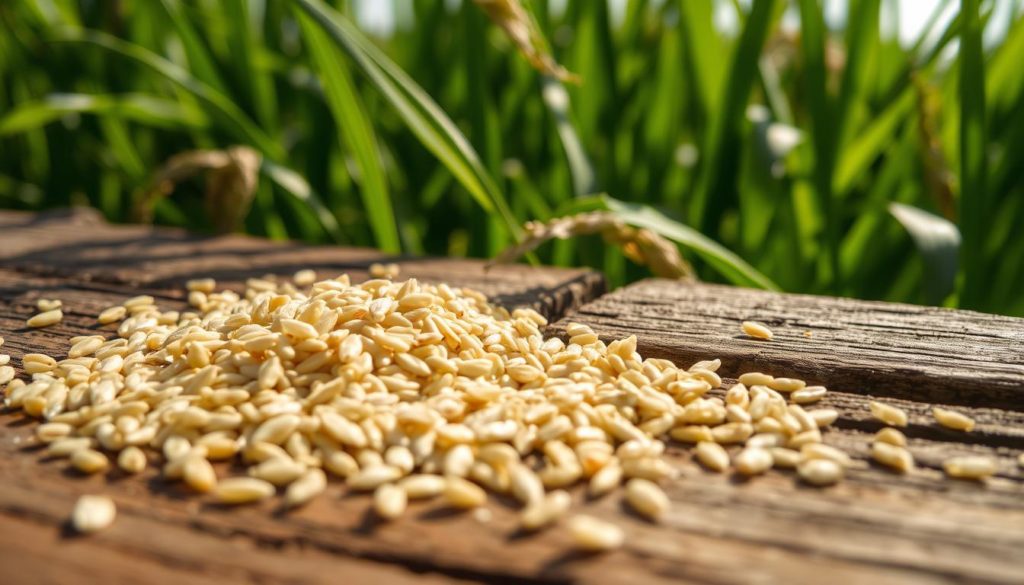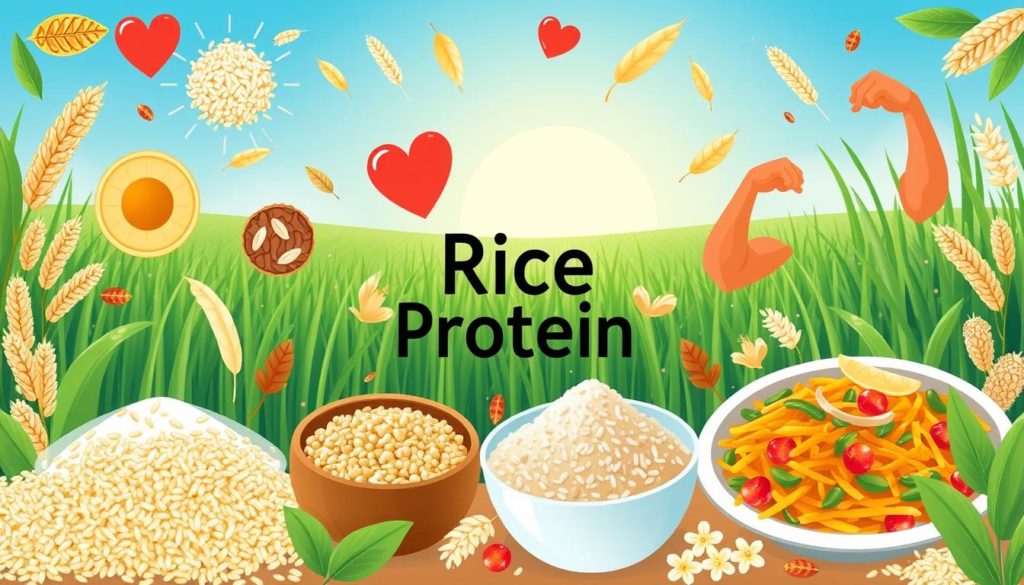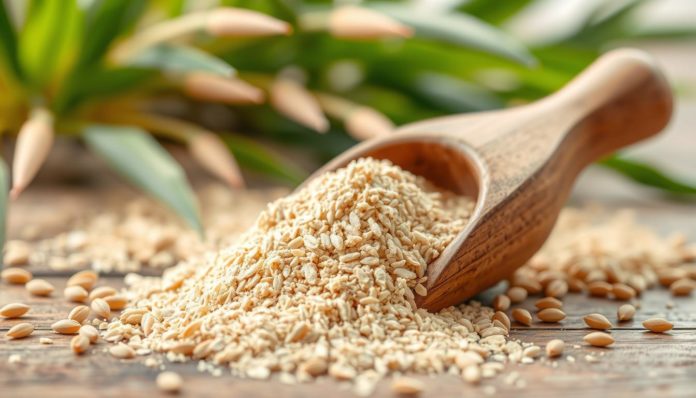Did you know rice protein can contain up to 70-80% protein by weight? This makes it a top choice for vegans looking for protein. It’s hypoallergenic and easy to digest, making it great for almost anyone.
Rice is a staple food for many people around the world. It’s now seen as a sustainable protein source. Rice protein powder is eco-friendly, helping to meet protein needs without hurting the planet.
This article shows why rice protein is more than a trend. It’s a key part of modern nutrition. Rice protein has a strong nutrition profile and low environmental impact. Let’s find out how rice protein powder can change your diet and help the planet!
What is Rice Protein?
Rice protein is a dietary supplement made from rice. It’s a top choice for those avoiding soy or dairy proteins. It’s perfect for anyone looking for non-GMO, plant-based protein. Rich in essential amino acids, it helps muscle growth and boosts health.

Understanding the Basics
Rice protein comes from rice grains. It’s made by separating protein from the carbs and fats. This method enhances its amino acids, making it a great protein source. It’s ideal for those allergic to common protein source allergens.
Types of Rice Protein
Market offers many rice proteins, including brown and white rice protein. Brown rice protein is less processed and high in fiber. White rice protein, though more processed, provides a smoother consistency in products. Organic types are preferred by those avoiding chemicals, and non-GMO options are valued for clean genetics.
Benefits of Rice Protein
Rice protein stands out due to its excellent nutritional value and health perks. It’s a great choice, especially for anyone looking for a gluten-free protein. Let’s look at why it’s so beneficial.
Nutrition Profile
Rice protein is admired for its stellar nutrition. It offers all essential amino acids, making it a whole protein. It’s also low in fat and calories but rich in vitamins and minerals. This supports your daily nutritional needs well.

Health Advantages
Rice protein brings many health benefits to the table. It’s especially good for muscle recovery, which is great news for athletes. Also, being hypoallergenic, it’s a safe gluten-free protein option for those with food sensitivities. Plus, it helps with weight control by keeping you full and boosting your metabolism.
Environmental Impact
Choosing rice protein is also a win for the planet. It leaves a much smaller carbon footprint compared to animal proteins. By adding rice protein to your diet, you’re practicing environmentally friendly habits. It’s a smart choice for anyone dedicated to protecting our environment.
How is Rice Protein Made?
The journey to create rice protein starts by picking top-notch rice grains. They go through many steps to keep their nutrition while pulling out the protein.
First off, workers clean the rice grains thoroughly. Then they grind them into very fine flour. After that, they use special enzymes on the flour, breaking the carbs apart. This is crucial for plants’ protein making as it helps split the protein from the rest.
After extracting, they dry the protein extract until it’s a fine powder. Keeping the protein’s quality high during this process is key. It makes sure the final product is not just healthy but also packed with good nutrition.
This complex method leads to making top-quality plant proteins. It offers a dependable and nutritious choice for everyone.
Rice Protein vs. Other Plant-Based Proteins
Choosing the right plant-based protein can feel overwhelming because there are so many choices. Let’s simplify things by comparing rice protein with other popular vegan protein sources:
Rice Protein vs. Pea Protein
Rice protein and pea protein are often compared by those looking for plant-based protein options. Pea protein is high in lysine but lacks methionine, which rice protein has plenty of. Rice protein is also easier to digest, making it a great choice for vegan diets.
Rice Protein vs. Soy Protein
Soy protein is a complete protein, containing all essential amino acids. But, it may cause allergies because of its phytoestrogens. Rice protein is hypoallergenic and free from such compounds. This makes rice protein a better option for people with sensitivities.
Rice Protein vs. Hemp Protein
Hemp protein is valued for its omega fatty acid content, which offers more than just protein. However, it has less protein per serving compared to rice protein. For those focusing on protein intake, rice protein stands out as the preferred choice.
Organic Rice Protein: A Healthier Choice?
Choosing a healthier protein is important. With organic rice protein, you get a big advantage. It comes from rice grown without harmful chemicals. This means it’s free from residues that could be bad for you.
Also, organic rice protein is non-GMO. This means it keeps its natural genes and helps protect nature’s variety. It’s perfect for those who care about health and the planet.
Here are some key advantages of choosing organic rice protein:
- Free from synthetic pesticides and fertilizers
- Supports biodiversity
- Adheres to non-GMO standards
- Offers clean and natural nutrition
Let’s compare organic rice protein to the regular kind:
| Aspect | Organic Rice Protein | Conventional Rice Protein |
|---|---|---|
| Cultivation Methods | Natural, free from synthetic chemicals | Uses synthetic pesticides and fertilizers |
| Environmental Impact | Supports sustainable farming and biodiversity | Potentially harmful to soil and ecosystems |
| Health Impact | No synthetic chemical residues | May contain traces of synthetic chemicals |
Choosing organic plant-based protein is good for you and the Earth. It helps you stay healthy and supports good farming. It’s part of living in a way that respects health and the environment.
Gluten-Free and Non-GMO Rice Protein: Safe and Clean
Nowadays, people are paying more attention to what they eat. They want protein sources that are both safe and of high quality. Gluten-free and non-GMO rice protein is becoming popular for its health perks and safety. It’s a top choice for many.
Importance of Gluten-Free Protein
For those with celiac disease or gluten sensitivities, it’s important to find safe proteins. Gluten-free rice protein cuts the risk of bad reactions. This makes it a worry-free choice for many. Products like Oryzatein® SG-BN rice protein are great for those avoiding gluten. They are easy to digest and gentle on the stomach.
Non-GMO Certification
Non-GMO certification means the rice for the protein was not genetically modified. Health-minded shoppers look for this label. They care about avoiding GMOs’ possible long-term effects. Products like Oryzatein® SG-BN show they’re committed to natural, healthy protein. They use methods that keep the protein pure and high in quality.
Who Should Use Rice Protein?
Rice protein is becoming more popular every day. It’s great for athletes, people who want to eat healthily, and those with food allergies. It’s a healthy choice that offers many benefits.
Vegan Athletes
Vegan athletes need protein that helps them grow and repair muscles. Rice protein is perfect for this, even though it’s not complete by itself. By mixing it with other plant proteins, vegan athletes can get all the amino acids they need. This mix boosts plant-based protein benefits for better strength and endurance training. Find out more about plant-based protein.
Health-Conscious Individuals
Those who care about health prefer clean, simple foods. Rice protein is just that, offering a pure plant-based protein. It fits well into a diet that aims for weight control, better liver health, and balanced cholesterol.
People with Allergies
Rice protein is great because it’s hypoallergenic. It’s an excellent option for people allergic to dairy, soy, or gluten. It’s a safe choice that’s allergy-friendly, ensuring everyone can enjoy its nutritional benefits without worry.
| Key Benefits | Details |
|---|---|
| Vegan-Friendly | Suitable for vegan athletes and can be combined with other proteins to be complete. |
| Health Boost | Supports weight management, liver health, and cholesterol balance. |
| Allergy-Safe | Hypoallergenic, making it a safe option for people with food allergies. |
How to Incorporate Rice Protein into Your Diet
Incorporating rice protein into your diet is easy and tasty. There are many recipes that use rice protein. This way, you can add this healthy ingredient to your meals every day.
Rice Protein Smoothies
Rice protein smoothies are quick and easy. They are perfect for breakfast or after exercising. Just mix rice protein powder with fruits, veggies, and more for a delicious drink. Here are some great things to blend in:
- Bananas
- Berries
- Spinach
- Almond milk
- Nut butters
Cooking and Baking with Rice Protein
Cooking and baking with rice protein is a great idea. It boosts the protein in your meals without changing the taste. Try these yummy recipes:
- Rice protein pancakes
- Protein-packed muffins
- Vegan protein brownies
- Homemade protein bars
Rice Protein Supplements
If you want more protein with ease, try rice protein supplements. Powders and bars are great for busy people or strict vegans. You’ll find many kinds to suit your needs.
| Type | Forms | Advantages |
|---|---|---|
| Powders | Unflavored, Flavored | Versatility, Easy mixing with liquids |
| Bars | Various flavors | Portability, Convenience |
Rice Protein: The Sustainable Protein Choice
More and more, people think about sustainability when they choose what to eat. Choosing sustainable options like rice protein is important in this movement.
- Lower Environmental Impact: Farming rice makes less greenhouse gas than raising animals. This makes rice protein a good eco-friendly choice.
- Efficient Land Use: Growing rice needs less land than keeping animals does. This leads to more sustainable food options.
- Water Conservation: Rice does need water, but new farming methods use water better. This helps save water.
When you pick rice protein, you’re making a choice that’s good for you and the Earth. Your choice supports lower carbon emissions and sustainable farming. It’s a way to make sure what you eat is healthy for both you and the planet.
Where to Buy High-Quality Rice Protein
Rice protein is sold at many places, both in stores and online, thanks to its growing popularity. You can find organic rice protein at health food stores like Whole Foods Market and Sprouts Farmers Market. These stores ensure their products are premium and safe, with non-GMO and gluten-free options.
Online shopping offers the ease of buying from home, with Amazon, Thrive Market, and iHerb leading the way. It’s key to choose brands you can trust, focusing on those with clear sourcing and ethical production. Reading reviews and ratings is a good step to ensure you’re getting dependable vegan protein.
If you’re looking for something special, try vegan and organic shops. These places often give detailed information about their rice protein, including third-party tests and certifications. Choosing products with these assurances means you’re investing in rice protein that meets your health and diet preferences confidently.
FAQ
What is rice protein?
Rice protein is a supplement from rice, for those wanting plant or vegan protein. It has many essential amino acids. You can find it as either brown or white rice protein.
How is rice protein made?
To make rice protein, producers separate the carbs from the protein in rice. They use enzymes to get the protein out, then dry it into powder.
What are the benefits of rice protein?
Rice protein is full of amino acids and is good for various reasons. It’s friendly for those with allergies, gluten-free, helps muscles recover, and is good for weight management. Plus, it’s better for the planet than animal proteins.
How does rice protein compare to pea protein?
Rice protein is easy to digest and has methionine, which pea protein doesn’t. Pea protein is rich in lysine but must be mixed with other proteins for a full amino profile.
Is organic rice protein better than regular rice protein?
Yes, organic rice protein comes from rice grown without harmful chemicals. This makes it cleaner and more natural. It also follows non-GMO standards, is healthier, and supports the environment.
Why is gluten-free rice protein important?
Gluten-free rice protein is safe for those with celiac disease or gluten issues. It’s a great option for anyone avoiding gluten.
Who should consider using rice protein?
Rice protein is great for vegan athletes, health-minded folks, and those allergic to dairy, soy, or gluten. It’s versatile and supports muscle and health.
How can I incorporate rice protein into my diet?
Mix rice protein into smoothies, or use it in recipes or baking. There are also ready-to-use supplements like powders and bars. It’s easy to add to many meals and snacks.
Is rice protein a sustainable choice?
Yes, rice protein has a smaller environmental footprint than meat. It’s a sustainable choice, encouraging eco-friendly agriculture.
Where can I buy high-quality rice protein?
Look for high-quality rice protein in health food stores, online, or in vegan shops. Choose organic, non-GMO, gluten-free options and check for third-party seals to ensure quality.


